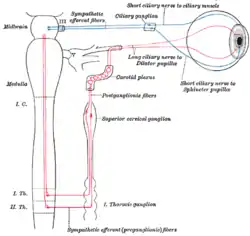General visceral efferent fibers
General visceral efferent fibers (GVE) or visceral efferents or autonomic efferents, are the efferent nerve fibers of the autonomic nervous system (also known as the visceral efferent nervous system) that provide motor innervation to smooth muscle, cardiac muscle, and glands (contrast with special visceral efferent (SVE) fibers) through postganglionic varicosities.[1][2]
| General visceral efferent fibers | |
|---|---|
 Scheme showing structure of a typical spinal nerve. 1. Somatic efferent. 2. Somatic afferent. 3,4,5. Sympathetic efferent. 6,7. Sympathetic afferent. | |
| Anatomical terminology |
GVE fibers may be either sympathetic or parasympathetic.[3]
The cranial nerves containing GVE fibers include the oculomotor nerve (CN III), the facial nerve (CN VII), the glossopharyngeal nerve (CN IX) and the vagus nerve (CN X).[4]
Additional images
 Sympathetic connections of the ciliary and superior cervical ganglia.
Sympathetic connections of the ciliary and superior cervical ganglia.
References
- Drake, Vogl, Mitchell (2010). Gray's Anatomy for Students, 2nd Edition. Elsevier.
{{cite book}}: CS1 maint: multiple names: authors list (link) - "Organization of the Nervous System | SEER Training". training.seer.cancer.gov. Retrieved 19 May 2021.
- Drake, Vogl, Mitchell (2010). Gray's Anatomy for Students, 2nd Edition. Elsevier.
{{cite book}}: CS1 maint: multiple names: authors list (link) - Mehta, Samir et al. Step-Up: A High-Yield, Systems-Based Review for the USMLE Step 1. Baltimore, MD: LWW, 2003.
![]() This article incorporates text in the public domain from page 849 of the 20th edition of Gray's Anatomy (1918)
This article incorporates text in the public domain from page 849 of the 20th edition of Gray's Anatomy (1918)
This article is issued from Wikipedia. The text is licensed under Creative Commons - Attribution - Sharealike. Additional terms may apply for the media files.